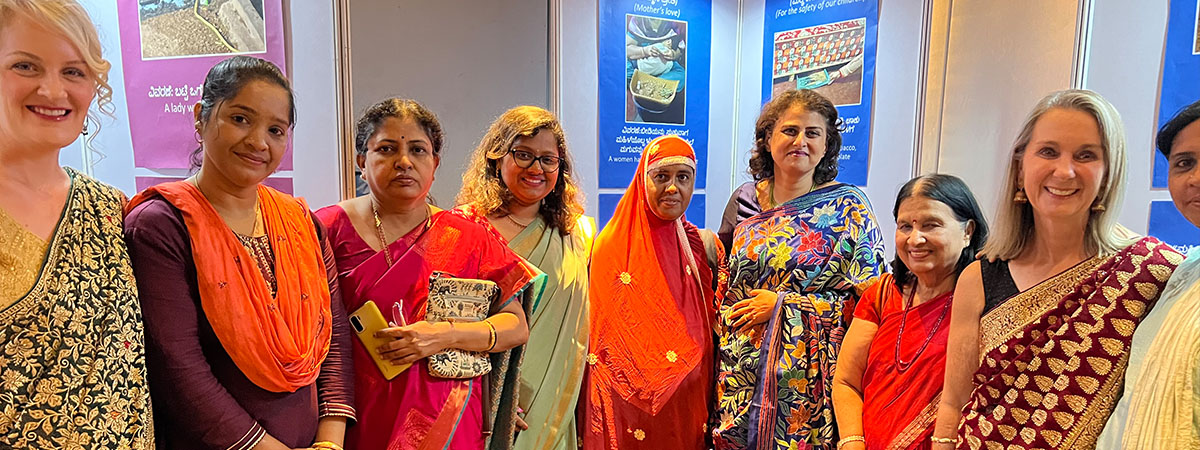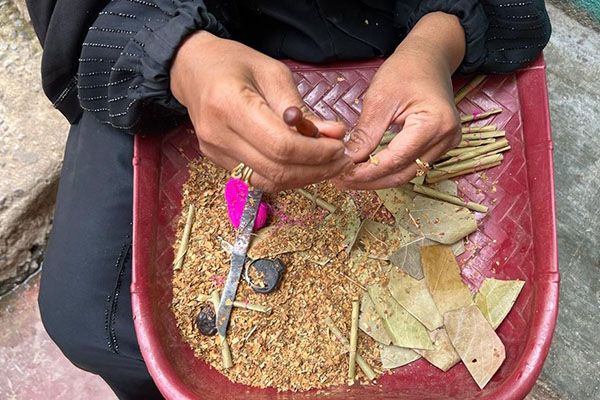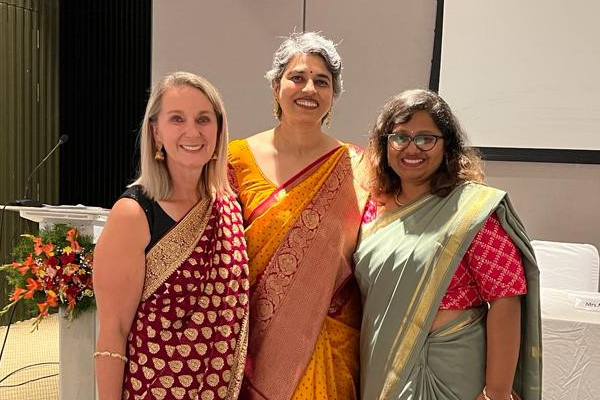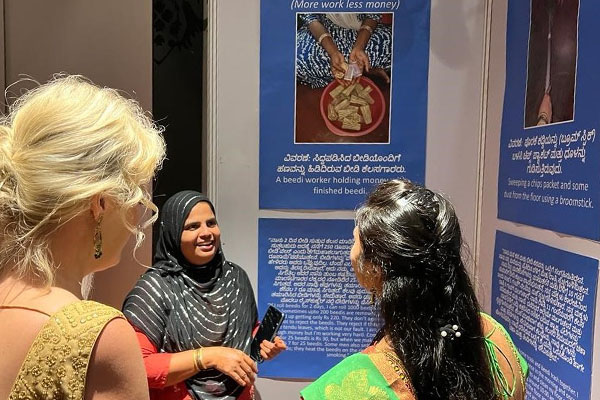Doctoral Student Leads Research Project to Evaluate Health and Safety for Tobacco Workers in India

Doctoral student Priyanka Ravi, MDS, has launched a groundbreaking mixed-methods research study on occupational health exposures among tobacco farmers and tobacco workers, predominantly women, in the city of Mysore, India, to evaluate working conditions and improve public health.
Story by Ashley A. Lowe, PhD, MSPH
Photo above: Dr. Lynn Gerald, Dr. Ashley Lowe, and Priyanka Ravi with Beedi workers, stakeholders, and PHRII staff.
In Mysuru (Mysore) District, India, doctoral student Priyanka Ravi, MDS, has embarked on a groundbreaking mixed-methods research study that aims to shed light on the occupational exposures faced by tobacco farmers and women beedi workers who process the tobacco. The project entitled, "Occupational Exposures among Women Beedi Workers in Mysore District, India: A Mixed-Methods Study," not only aims to uncover the challenges these workers encounter, but also seeks to explore their experiences using an innovative community-based participatory method called Photovoice. Priyanka is working towards her PhD in Health Behavior Health Promotion at the University of Arizona’s Mel and Enid Zuckerman College of Public Health.

Woman rolling beedi in Mysore, India
Beedi, known as the "poor man's cigarette," is manufactured in various states of India, including Mysore District. The process of making beedis involves collecting tendu leaves and tobacco, rolling them into beedis, and then sorting, labeling, wrapping, and packing. Most of the employees responsible for rolling beedis are women. Most beedis workers perform the job in addition to other daily tasks which include caring for their families and keeping house. On average beedi workers roll up to 1,000 beedis per day for which they are paid approximately $3.00 (USD). The city of Mysore, located in the southern Indian State of Karnataka, is the third-most populous city in the state.
Unfortunately, beedi workers face a range of health risks due to poor working conditions, including issues such as inadequate lighting, poor ventilation, and overcrowding. Occupational exposures, such as the handling of beedis and tobacco, as well as the inhalation of tobacco dust, pose significant health hazards to these women. Furthermore, the presence of copper, sulfur, potassium, and organophosphates in pesticides used during tobacco farming and the beedi rolling process exacerbates these risks. Studies have linked these pesticides to genomic instability and genotoxicity, highlighting the urgent need for further research.
The research study is supported by an award from the Southern California NIOSH Education and Research Center (SCERC) Pilot Project Research Training (PPRT) Program Grant, with additional funds from the Mel and Enid Zuckerman College of Public Health and from the One Health Initiative at the University of Arizona.
Partnership with the Public Health Research Institute of India

Professor Lynn B. Gerald, Drs. Purnima Madhivanan and Priyanka Ravi
On the project, Priyanka works closely with the Public Health Research Institute of India (PHRII), a regional non-profit founded in 2007 by MEZCOPH faculty Dr. Purnima Madhivanan and Dr. Karl Krupp. Dedicated to improving the health of communities in Mysore District, India, PHRII works collaboratively through their Prerana Reproductive Health Clinic and mobile clinics to provide outpatient services, family planning, reproductive healthcare, and cancer screening to low-income communities. Their administrative core supports grant initiatives, while their community department conducts education and awareness programs. All this work advances the PHRII mission: To promote quality of life, well-being and health for women and children through research, training and evidence-based advocacy and care.
This summer marks the second consecutive summer Priyanka has worked in Mysore with the Beedi community, an initiative supported by the Zuckerman College of Public Health, the Global Health Institute (GHI), and PHRII. In 2022, Priyanka was funded as one of the 2022 GHI Scholars. She also presented as part of the Global Health Speaker Series about her experience working in Mysore during summer 2022.
Priyanka’s faculty and project mentors include Professor Lynn Gerald from the University of Illinois -Chicago, Professor Frank von Hippel, Associate Professor Dr. Purnima Madhivanan, Assistant Professor Karl Krupp, Assistant Professor Amanda Wilson, and Research Assistant Professor Ashley A. Lowe from the Mel and Enid Zuckerman College of Public Health, and collaborators Associate Professor Eva Moya at the University of Texas at El Paso, and Assistant Professor Amina Salamova at Emory University.
The Innovation of Community-based Mixed-Methods Research
Previous research on occupational health among beedi workers has relied on quantitative methods, limiting the understanding of the lived experiences of women in this industry. To bridge this gap, Priyanka’s study in the Mysore District uses a complex mixed-methods participatory design, integrating qualitative methods with quantitative data collection. This innovative, comprehensive approach allows researchers to incorporate measured occupational dust indicators alongside the personal narratives and experiences of women beedi workers, contributing to research and advocacy efforts for safer working environments and engaging the workers and their community in the process.

Photo Voice Exhibition at the Hotel Grand Mercure in Mysore, India, on June 3rd, 2023
To ensure the inclusion of participants' voices and experiences, Dr. Ravi uses Photovoice, a community-based participatory research method that engages and empowers the participants to record and reflect on their community's strengths and concerns, promoting critical dialogue and knowledge about important issues. Through Photovoice, the women beedi workers captured photographs that best represent their workplace challenges related to occupational health.
On June 3rd, 2023, PHRII hosted a photovoice exhibition for all the project’s stakeholders and the community. Among the attendees were the women beedi workers who participated in the research project. As one of her faculty mentors, I was blessed to not only attend the photo voice exhibition but see in-person the community and research that Priyanka has conducted for the past two years. With great pride and admiration, I witnessed her incredible work and the empowering voices of the women of Mysore involved in beedi and tobacco work.
Priyanka Ravi's study on the occupational exposures faced by women beedi workers in Mysore District, India, represents a significant step towards understanding the occupational challenges they encounter. This study not only sheds light on an important occupational health issue but also contributes to the broader mission of making good health a reality for every individual in Mysore District.

